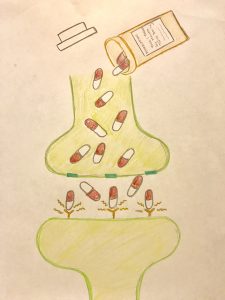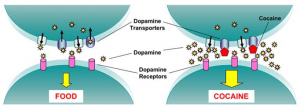
What is Drug Addiction:
Drug addiction is a medical condition characterized by the compulsive seeking and taking of drugs for rewarding stimulus despite adverse consequences or loss of control over drug use. Drug addiction occurs due to long-lasting changes that occur in the brain from prolonged use, but not everyone is affected in the same way. Genetics account for 50% of an individual’s variability in addiction vulnerability, while the other 50% comes from a wide array of environmental factors. Once an individual becomes addicted, it can be extremely difficult to stop, and the chance of relapse will continue to be present.
Why Are These Drugs So Addictive?
Drugs can be so addictive because they hack the reward pathway in the brain. The reward pathway is a pathway in the brain that enhances certain behaviors that are necessary for survival, such as eating, drinking, sex, and social interaction. Drugs turn these survival needs into drug needs.
The reward pathway involves the transmission of dopamine. Dopamine is release when an individual engages in pleasurable activities and binds to an adjacent neuron in the brain. The binding of dopamine to a dopamine receptor is what gives a pleasurable feeling or rewarding effect, making you want to continue to do that activity. Eventually this dopamine is taken back into the neuron by a molecule called dopamine transporter.

Drugs abuse this system by increasing the amount of dopamine present in the synaptic cleft. Some drug increase the number of action potentials which leads to increased dopamine release, other drugs increase dopamine without the action potential, and some block the reuptake of the dopamine back into the neuron. Whatever the method, they all work to keep the concentration of dopamine high in the synaptic cleft for an extended period, causing the prolonged and intense euphoria described by drug use. These repeated exposures to dopamine surges desensitize the reward system which makes those normal, necessary action for survival no longer a priority as drugs are the only rewarding thing. With continued drug exposure, the reward system continues to become more and more desensitized requiring more drug for the same effect. This is what can eventually lead to overdose.
What Can You Do?
It is important that we remember that individual who deal with addiction are struggling with a neurological illness that so far appears to be irreversible. We as a society need to learn to treat this as any other neurological disease and help those who are struggling as this is far more than just a choice as the brain structure is literally altered. This is why it is important that we avoid street drugs with all costs and take medically prescribed drugs with extreme caution.